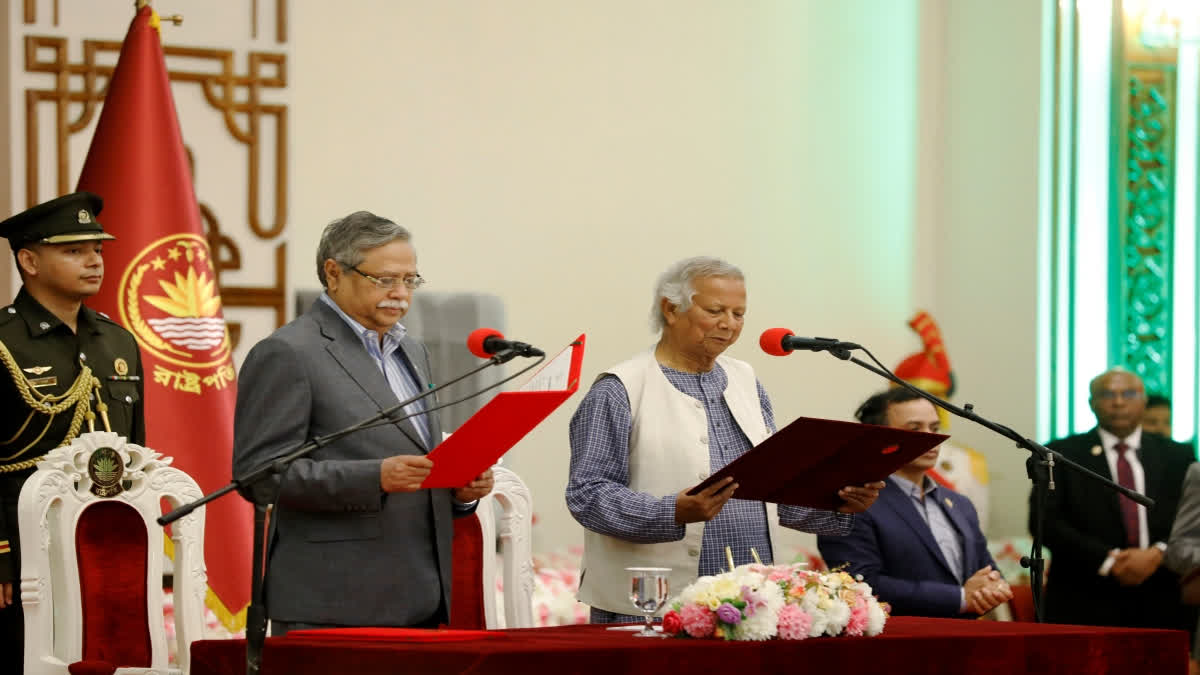Dhaka: Nobel laureate Muhammad Yunus took the oath of office as head of Bangladesh’s interim government Thursday after an uprising prompted former Prime Minister Sheikh Hasina to step down and flee to India.
The key tasks for Yunus now are restoring peace in Bangladesh and preparing for new elections following weeks of violence in which student activists led an uprising against what was considered Hasina’s increasingly autocratic 15-year rule. Bangladesh’s figurehead President Mohammed Shahabuddin administered the oath to Yunus for his role as chief advisor, which is the equivalent to a prime minister, in the presence of foreign diplomats, civil society members, top businessmen and members of the former opposition party at the presidential palace in Dhaka.
No representatives of Hasina's party were present. Sixteen other people have been included in the interim Cabinet with members drawn mainly from civil society and including two of the student protest leaders. The Cabinet members Yunus as interim leader were chosen in discussions this week among student leaders, civil society representatives and the military.
Hasina quit on Monday after several chaotic weeks that began in July with protests against a quota system for government jobs that critics said favored people with connections to Hasina’s party. But the demonstrations soon grew into a bigger challenge for Hasina’s 15-year rule as more than 300 people including students were killed amid spiralling violence.
Yunus, who was awarded the 2006 Nobel Peace Prize for his work developing microcredit markets, was in the French capital for the 2024 Olympics when he was chosen for the interim role, and returned home earlier Thursday to tight security at the airport in Dhaka. In his first comments after his arrival, he told a news briefing that his priority would be to restore order. “Bangladesh is a family. We have to unite it,” Yunus said, flanked by student leaders. “It has immense possibility.”
On Wednesday in Paris, Yunus had called for calm and an end to all partisan violence. Hasina’s son Sajeeb Wazed Joy, who acts as an adviser to his mother, vowed Wednesday that his family and the Awami League party would continue to be engaged in Bangladesh’s politics — a reversal from what he’d said earlier in the week after Hasina stepped down Monday and fled to India. The president had dissolved Parliament on Tuesday, clearing the path for the interim administration.
On Wednesday, a tribunal in Dhaka acquitted Yunus in a labour law violation case involving a telecommunication company he founded, in which he was convicted and sentenced to six months in jail. He had been released on bail in the case. Yunus has been a longtime opponent of Hasina, who had called him a “bloodsucker” allegedly for using force to extract loan repayments from rural poor, mainly women. Yunus has denied the allegations. The chaos on Bangladesh's streets continued after Hasina’s resignation on Monday.
Dozens of police officers were killed, prompting police to stop working across the country. They threatened not to return unless their safety was ensured. The looting of firearms also was reported in local media. The unrest began in mid-July with protests over the quota system but grew into a broader challenge over an administration that was marked by human rights abuses, corruption, allegations of rigged elections and a brutal crackdown on her opponents.
Read More
- Nobel Laureate Muhammad Yunus Returns From Paris to Head Bangladesh's Interim Government
- Bangladesh Crisis: Fresh Elections 'In A Few Months'; Nobel Laureate Yunus Urges People To 'Get Ready To Build The Country'
